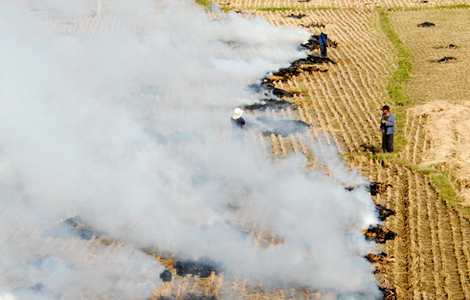Warrior spirit of Genghis Khan
Updated: 2011-10-11 08:27
By Chen Jia (China Daily)
|
|||||||||||
DONGXIANG, Gansu - The offspring of Genghis Khan's forces are leading an army of workers building highways and railways in the most inhospitable places in China.
Eight years ago, Ma Yousufu decided to leave the dry and forbidding mountains of his home to join a team building the Qinghai-Tibet railway in Northwest China - the highest railway project in the world.
|
 |
"It was difficult to breathe," said Ma, 47. "It was higher than 5,000 meters above sea level. Every day I was struggling with a pounding head and severe vomiting," he said.
"My lips were full of bleeding blisters. It was hard to eat and the weather was freezing."
Ma is a member of the Dongxiang ethnic group in Gansu province, one of the poorest and most isolated places in the country.
Many Chinese scholars believe that Dongxiang people are descendants of Mongol soldiers from Genghis Khan's army who settled in Gansu during the 13th century when the Mongols ruled China under the Yuan Dynasty (1271-1368).
To lift themselves from poverty, about 600 farmers from the Dongxiang autonomous county followed Ma to the railway construction project and they completed the highest section in the Tanggula Mountains.
Tanggula is a Mongolian word meaning a high place that even eagles cannot fly over.
Because of the harsh environment, many construction companies took their names off the bidding list. The project was handed to the team from Dongxiang and included railway beds and bridges, culverts and slope protection.
Ma Zhanming, head of the Labor Bureau of Dongxiang, said more than 6,000 people from the county worked on the Qinghai-Tibet Railway yearly from 2002 to 2006. Doing excellent work, they were praised as "Dongxiang invincible army".
Now he and his team of more than 300 are building a highway in Northwest China's Xinjiang Uygur autonomous region.
"It is always windy and dusty in Xinjiang, and drinking water is scarce," Ma said. "But I don't think that is difficult after I came back from the Qinghai-Tibet Plateau."
"We were born and live in high altitudes, and our lives were hard," said Ma. "Or maybe because we Dongxiang people are the offspring of Genghis Khan's forces we are strong and able to withstand hardship," he said.
"The only way we can change our lives is to fight against challenges from the outside world with our hands," Ma said.
Hot Topics
Libya conflict, Gaddafi, Oil spill, Palace Museum scandal, Inflation, Japan's new PM, Trapped miners, Mooncake tax, Weekly photos, Hurricane Irene
Editor's Picks

|

|

|

|

|

|







